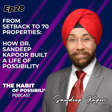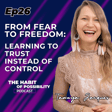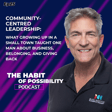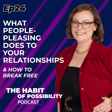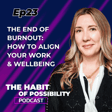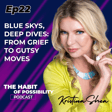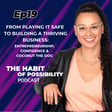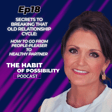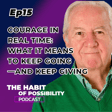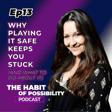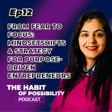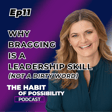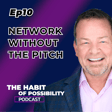Introduction and Self-Deception
00:00:00
Speaker
The person who's fooling you the most will always be you. Will always be you. The question is, are you on to yourself?
00:00:13
Speaker
Welcome to the Habit of Possibility podcast, the show about turning obstacles into opportunities. I'm your host, Robby Spear-Miller.
00:00:24
Speaker
Today, we are exploring how our subconscious minds respond to magic and how we can expand our possibilities with this awareness.
Guest Introduction: Scott McFall
00:00:33
Speaker
Our guest today is Scott McFall, magician, mentalist, and hypnotist who has helped thousands of people improve their lives over the past 40 plus years.
00:00:44
Speaker
Hello, everyone. This is Robbie Spear-Miller with the Habit of Possibility podcast. And today we're going to be talking with Scott McFall, who's been my mentor for, I think, about 17 or 18 years now.
Subconscious and Magic: Perception Impact
00:00:56
Speaker
um And he is a magician, a hypnotist, and actor. And he spent a lot of time being curious about how our human minds work and how magic can open us up in different ways. And so today I would like to explore that topic so that you can see how um engaging with magic can help you see different possibilities in your life.
00:01:21
Speaker
So welcome, Scott. Hi, Robbie. How are you? Doing great. I'd like to know what what is it that stands out the most for you about magic that helps you see things other people don't see or communicate in ways that maybe other people don't perceive?
Changing Beliefs: The Role of Neurolinguists
00:01:41
Speaker
I think that maybe the best way to explain it is to talk about a context. When we get paid as neurolinguists and hypnotists to help people change what they can and cannot see or or what they believe or what they don't believe, what is possible and what is not possible for them.
00:02:00
Speaker
We have to change what they think, what they believe, how they filter the world around them. So in an academic sense, when you're in a classroom, it's incredibly difficult to get people to see that the way they're thinking is made up in their head and that they're that they're projecting a lot of that onto the world where the world itself, you know,
00:02:21
Speaker
is There's a Mark Twain quote that ends with, they believe so many things that just aren't so. you know And so we end up in ah in a situation where our job to begin with is to loosen up an individual's model of the world, what they think they know, and then help to teach them how to observe either an outcome that they want in the future and reverse engineer it or see that their assumptions turned out to be false.
00:02:51
Speaker
There are so many factors that impact this, like their loyalty or disloyalty to their parents, their loyalty or disloyalty to um a group, whether it's the military or religion or the way that their school philosophy works or how their license track profession thinks or or whatever it is.
00:03:11
Speaker
So there's social reasons that they believe what they believe. There's a fear of shame that may be the reason that they believe what they believe. There's all kinds of things that are affecting them.
Editing Perception: Brain and Social Influences
00:03:21
Speaker
So you're in a classroom and you try to tell somebody human perception has to be edited in order to get in the brain. Because if you took in everything that's going on in the world around you, your awareness cannot process everything that's going on in the world around you.
00:03:37
Speaker
Now the way they explain it in NLP is they have some arbitrary numbers. Who knows where they came up with these numbers, but they say you that 2.3 million bits of information per second are hitting your nervous system and your brain can process 150 bits per second plus or minus four is what all these textbooks say.
00:03:57
Speaker
I want to meet the guy who measured that or the woman who measured that. i want I want to understand the measuring device they use to come up with those numbers because obviously they're quite arbitrary. you know But the thing is that we do have more sensory input hitting us than we can possibly take it.
00:04:15
Speaker
For example, ah right now you're not thinking of where your clothes are touching you or where your hair might be touching your ear. So we have to figure out somehow which information to pay attention to and which information to not pay attention.
00:04:30
Speaker
We also have to figure out which information we believe and which information we don't believe. There has to be a mechanism by which we do this.
00:04:41
Speaker
The brain can project information quite intensely. In schizophrenia or other medical conditions, we see some very dramatic versions of hallucination and so on, don't we?
00:04:52
Speaker
Yes. We can also see these things with regard to to certain drug impact. But what we don't spend a lot of time studying is how limiting, as we grow up,
00:05:05
Speaker
We get conditioned responses and routines. How do we tie our shoes? How do we put peanut butter on toast? What way do we ride a bike? And all of these habits start to make us see or not see certain things that are going on around us.
Habits and Routines in Perception
00:05:21
Speaker
For example, I don't really have a morning without coffee first. My nervous system seems to believe that there is no morning moving on without a cup of coffee, for example. Well, according to who?
00:05:33
Speaker
And where did this start? I didn't always drink coffee in the morning. Right. There's no basic need for coffee. And my nervous system radically disagrees with this. Radically disagrees, right?
00:05:46
Speaker
So what i what I would like you to think about is how do we loosen up an individual to take in the world around them?
00:05:57
Speaker
And it's harder than it looks. It's harder than it looks. So... Magic begins to demonstrate the art of entertainment magic Begins to demonstrate that we're not taking in everything in the world around us, right?
00:06:13
Speaker
Mm-hmm And it starts to introduce the idea that maybe I don't know everything now of course then you learn so much about people because you see the people that that makes incredibly frustrated and you see the people that that makes really entertained And you see the people that are having to figure it out and they will come up with an absolute thing they know is how they did it.
00:06:36
Speaker
Frequently not correct, but very assertive about how it was done. you know Right. So some people believe that if it fits into the structure they're used to, then it's true.
00:06:48
Speaker
Right. And that can kind of be like the magic wand and a magic trick. Right, right. So like this rope, for example, you know, if, you know, we're ah we're looking at a rope.
00:07:02
Speaker
Now, have have you have you been mastering any magic tricks? I have done a couple over the years. I need to do more. So if we take the rope and we cut it, you know, then people are going to start to begin to believe that we're going to magically put it back together, right?
00:07:23
Speaker
That's what they're going to think. So as we take the rope and we magically put it back together, right, that's going to get a laugh. So the the thing that happens with the audience is that they can understand that that knot is tied the rope back together.
00:07:39
Speaker
Right. So for people who are listening and not watching, can you describe what you did in words? Oh, I tied rope in half and tied a knot in it, tying it back together, acting as if I was magically tying it together.
00:07:53
Speaker
Right. But what starts to mess with people is when you do something like this. hu And so their reality begins to be changed as that knot can be slid at various places in the rope, right?
00:08:06
Speaker
Right, so you think the the knot is holding the rope together, but really it's not attached to the rope at all. And you grab the rope and you slide that knot off the rope, you know. And the whole point of it is that that is now outside of their reality.
00:08:21
Speaker
That is now outside of their scope of of what they perceived. So that is known in magic as a sucker gag where they believe they know what you did, but they do not know what you did,
00:08:34
Speaker
Right. Make sense? Yep, absolutely. Yeah. So we're where these sucker gags are happening all the time in real life. Right. Does that make good sense?
00:08:46
Speaker
It does. Yeah. And we do them to ourselves and you know the world around us does it and it's everywhere. Right. Right. So now talk about, ah just as a question back, do you remember watching the Hindu basket on the deck in Raleigh, North Carolina? Right.
00:09:05
Speaker
I remember watching, but that was a long time ago, so I'm not sure i remember a lot of details. ah Remember that you watched a person be put in a wicker basket, very small wicker basket, and then massive torches be shoved through the basket and swords shoved through the middle where there was no possible way for someone to be in that basket.
00:09:29
Speaker
Right, without getting hurt, Right. And so as you watch that, you came up with the idea that there had to be a hole in the deck. I specifically came up with that idea?
00:09:40
Speaker
Okay. that kind Clearly you remember this more than me. Okay. Yeah. Because of course it's fascinating that you would come up with that. Right.
Myths, Imagination, and Human Understanding
00:09:50
Speaker
And so in, in magic, that particular illusion is, you know, centuries, even, you know, thousand year old effect that was used to ah demonstrate the idea of magic or the idea of of imperviousness to attack right mm-hmm and so there's a lot in for instance spiritualism where we see people meditating and levitating
00:10:26
Speaker
in art and in papyrus and all kinds of places where what we're really seeing is the way that people utilized myth to get individuals to chase higher forms of meditation or more yoga or chasing a higher performance.
00:10:45
Speaker
Right. Right. And so there's a lot of people that meditate and attempt to float meditating.
00:10:56
Speaker
And there's a lot of myth involved in the idea of floating meditating because of an illusion where a yogi would be holding a feather while levitating above a chair.
00:11:09
Speaker
And the issue is that there are secret ways that that yogi is being held up. But then, of course, the students continually chase this dream. Right.
00:11:21
Speaker
So we need to understand that our imagination is what is necessary to speculate about the future. And if we only use our imagination away from the fears that have happened to us in the past, the threats that have happened to us in the past, we do less and less, or we only do the same thing over and over and over again.
00:11:45
Speaker
Right. Yes. Yes. So to me, there's incredible power in understanding how reality itself gets formed. There are incredible illusions in our perception based upon our perception of who we are.
00:12:00
Speaker
Are we willing to see ourselves as the hero? Are we willing to see ourselves as the villain? and yeah Jung came up with the idea of the shadow self, trying to get people to understand how to process when they're doing the the good thing or the bad thing, or when they're not understanding the impact of their behavior on others and how to evaluate their own behavior without shame destroying their ability to perceive reality itself.
00:12:27
Speaker
So in the Emperor's New Clothes, we see that we become by far the blindest we ever are is when we're on a high. By far the blindest we ever are is when we're triumphing and we're ego high and we're euphoric and Right.
00:12:45
Speaker
Think about the behavior on New Year's Eve and we're euphoric and people's behavior is very uncontrolled, for example. um So there are moods that are highly illusionary.
00:12:58
Speaker
And so people don't want to be wrong. And once they have an assumption, the hardest thing to do is teach them that the assumption might have been incorrect.
00:13:09
Speaker
People believe illusionary materials all the time. One of my favorite debates to get into is the debate of evolution. And it's not a debate in the minds of most academics in any way.
00:13:23
Speaker
Not a debate at all. And it's interesting because um their their evidence will be, well, we can breed flowers and we can do genetic manipulation and we can do this and we can do that.
00:13:35
Speaker
And so you'll you'll say to them, have you ever made a flower into an aardvark? You know, have you ever made... a lizard into a sloth, you know?
00:13:47
Speaker
And it's not that evolution is true or false. That's not the point. The point is not whether it's true or false. It's, is there direct evidence of it? Right. We're making leaps is what you're saying. We're making leaps and assumptions.
00:14:01
Speaker
Yeah. Yeah. A magician is going to be very aware of those leaps.
Assumptions and Education: Perception Challenges
00:14:06
Speaker
Whereas a person trying to be hyper literal is ironically going to believe leaps more.
00:14:12
Speaker
It's easier to fool a scientist than a child. A child will see the things going on, a scientist will not. And the scientist will not see it because the scientist believes his own perception or her own perception.
00:14:25
Speaker
So obviously I can't tie a knot in this without letting go of an end. So if I don't let go of an end at all, and I just take this rope and do this, there's no way that that knot could be in there if I didn't let go of an end.
00:14:39
Speaker
So for hours and hours, you've watched me with people with PhDs and physicians and so on, who over and over again cannot make that happen. Because they cannot wrap their mind around that they're missing a piece of information.
00:14:54
Speaker
They believe their own perception. Does that make sense? Do you see the truth of that? Yeah, so would you say that it's because when people are educated to that level, they often have a lot of pride in the fact that they're that they know stuff or that they they are maybe they their view is reliable or that they see things rationally.
00:15:17
Speaker
So the idea that they're missing something is a shameful thing to them or something that's emotionally uncomfortable for them. Is that? Maybe, maybe.
00:15:27
Speaker
Mm-hmm. Maybe, but I think it's also just a simple matter of habit. Like, sure, there may be some pride in it, but I think their perception seems to work every day.
00:15:39
Speaker
So why wouldn't they believe it? You know, ah it's it's I think the important concept here is can you be externally curious and can you fantasize three or four possibilities instead of that it has to go one way?
00:15:55
Speaker
or maybe seven possibilities or or whatever it is. Right. Okay. So, so the question comfortable being comfortable with not knowing, or that there could be a lot of ways this is happening that you're not seeing and totally at peace with that.
00:16:12
Speaker
The issue is thinking you have to know, right? A person who is a highly successful academic, is usually not very effective in real life.
00:16:24
Speaker
C students tend to out earn A students. Why is that? Maybe one of the big reasons is the concept of being comfortable winging it.
00:16:34
Speaker
Maybe being comfortable winging it is really important. Maybe being comfortable winging it is incredibly important. So in magic, you're showing someone that their assumptions might be false.
00:16:46
Speaker
And as you're showing them that their assumptions might be false, they consider possibilities. So Siegfried and Roy's show in Vegas, for example, sig they had this sar morte, sar morte, this magic word.
00:16:58
Speaker
And this word means meant Siegfried and Roy, masters of the impossible. And they pushed the impossible their whole lives. And they're they both passed on now. And of course, what they're known for nowadays, more than anything else, is the fact that one of their tigers attacked Roy late in their career.
00:17:15
Speaker
But in reality, they had a tens of millions of dollars show at the Mirage for years on end, as well as other shows, where people floated and vanished and materialized and dragons appeared and all kinds of things took place that was a surreal fantasy event.
00:17:34
Speaker
that changed what people in the audience believed happened to be possible. And it was based upon the concept of secrets, on the concept of what don't they know? And so these two big stars would be wandering through the audience and there are these black hooded figures that were giving little kids stickers like little lions and little hearts and little stuff.
00:17:54
Speaker
Well, it was actually both of them were people doing that. They were walking through the audience and they they liked the fact that the audience didn't know that they had touched them in a caring way kind of thing, you know?
00:18:06
Speaker
So how much does this help in parenting, Robbie, to know that this child's perception does not match your adult perception? How much does it help with a student to pace, here's what they are understanding and not understanding in this moment, and here's the pace at which we're going to go through this stuff until they really have mastered it.
00:18:27
Speaker
How powerful is it just to sit there and look at them until they realize, oh, I have to do it so that this person can see me do it. And in order to know this, we have to understand this, even the idea of teaching, we have to know the difference between the way they're filtering reality and what they're seeing and what we know and how we're filtering reality.
00:18:48
Speaker
So when you're in that type of position as a teacher or a parent, and you know more than the people who you're leading, there's a lot of responsibility associated with that because somebody who doesn't have integrity can use that in a way that would not, would be hurtful to the person or would mislead them.
Learning from Mistakes: Creating Safe Environments
00:19:08
Speaker
Even, even accidentally. and so Yeah, even accidentally. And the issue is that if a person is not safe being wrong, it's very difficult to give them feedback if they're not safe being wrong.
00:19:22
Speaker
So perhaps one of the first lessons is how do you help a student be safe being wrong? Yeah, we we we do that a lot with students. It's a very common theme. Yeah.
00:19:34
Speaker
Yeah, I think the a Karate Kid movie, excuse me, yeah the Karate Kid movie is a very powerful point where it's ah the the Ralph Macchio version because because you see Miyagi doing the wax on, wax off, paint the fence, sand the floor.
00:19:52
Speaker
And Ralph Macchio's character, Daniel, is rebelling against this because he feels exploited until... ah Miyagi shows him that, wow, this is really related to your karate training.
00:20:06
Speaker
And Miyagi sort of sets him up to rebel against it on purpose.
Mystery and Emotional Engagement in a Digital World
00:20:09
Speaker
He doesn't give him enough information so that ah Daniel finds out he was wrong and that it was benevolent and loving and caring to show him in that way not mean or a weird trick or something awful, but rather a very benevolent and caring thing that was done for him.
00:20:28
Speaker
Right. So keeping the mystery alive, keeping the joy alive is extremely important in the modern world with regard to the web and artificial intelligence and all of the things that are taking place.
00:20:43
Speaker
ah Information has taken such a high position that emotion, mystery, anticipation, the the emotional motivation that makes life work is no longer front and center.
00:21:00
Speaker
Well, that is not increasing the quality of life for human beings in any way. It's doing quite the opposite. So in magic, one of the most difficult things to do with a kid teaching them magic is to get them to stop teaching the secret.
00:21:14
Speaker
Because once they show you it and you're amazed, they want to show you how it's done to show that they're smart. And it's incredibly difficult to get them to not show the secret. Man, is it tough to get them to stop doing that.
00:21:26
Speaker
And I remember when I was a little kid learning to not do that, drove me crazy. Because you have a desire to show you're competent. That's why when I see people who teach the kinds of things that we do in neurolinguistics, hypnosis, and so on, and they're teaching it to get some kind of weird advantage instead of to communicate right or whatever, it infuriates me.
00:21:44
Speaker
Right. So they're teaching it for themselves because they want to be seen a certain way. They're not looking at what what would be most useful for the other person. Right.
00:21:56
Speaker
We shouldn't be making better criminals. We should be helping people to be better people. So when an individual shows up who's immature, who wants to get a weird advantage, that's not the time to hand them a tool.
00:22:09
Speaker
But that art form is being lost. So there is magic and the magic is in the mind of the viewer and the magic doing things. Hypnosis, neurolinguistics, helping people to quit smoking or get control of their weight or change the way they communicate in relationships or alter the way they anticipate the future to be enthusiastic to some degree rather than averse to their own future.
00:22:36
Speaker
and Or to change the way they interpret when they let themselves down so they learn from it instead of getting disillusioned or disheartened from it. Right, or when the world lets them down, because I think all of us have had the experience of somebody doing some kind of real world magic trick that wasn't in our interest.
00:22:56
Speaker
And you can respond to that to say, I'm never going to let that happen again. Or you can go, yeah, that's human nature and learn from it and look for positive ways to experience, useful ways to experience magic for possibilities.
00:23:12
Speaker
Yeah. That's the first learning that comes before the one I was talking about. The second learning is I'm just like them. Holy crap. Yes. Right. Like nobody, nobody is not tricked.
00:23:26
Speaker
That's what you mean. Well, more it's one that nobody is not, nobody is who they think they are. Right. The person who's fooling you the most will always be, will always be you.
00:23:39
Speaker
And so the the question is, are you on to yourself? And so in in in NLP, in neurolinguistic programming as an art form, they talk about, can you see what someone else is doing in their attitudes, values, beliefs, and how they're making decisions and so on?
00:23:57
Speaker
But then they talk about, can you do that with yourself? can you Can you step out of yourself in the third person and see your own attitudes, values, beliefs, decisions, strategies, and so on, and see when they're accurate or inaccurate and so on? and Or see see what your real motives are.
00:24:13
Speaker
are Are you able to admit your own secondary benefit to the things that you're doing? And i can I can say with experience as a teacher, I'm aware of i'm aware of folks where that never happens, where they never see their own secondary benefit.
00:24:31
Speaker
Can you explain your own what what secondary benefit is? Because some people might not know. um Secondary benefit, all human behavior begins from a positive intention is one of the assumptions we make.
00:24:44
Speaker
And so even though there might be a negative behavior, all behavior begins for some reason. Like, Maybe it's to blow off steam or to defend oneself or to relax or to escape a different stress. there's There's always some reason.
00:25:01
Speaker
So even though smoking is very negative, you know, they're deep breathing, they're escaping something, they're relaxing, maybe they're rebelling. So there's always a secondary gain to something they that you're doing.
00:25:14
Speaker
And even if it's something you need to shift or quit, and if you're agreeing with that positive intention, you can always get it a new and different way. But if you're fighting with yourself, you tend to kind of go in a circle, getting the secret positive intention or almost secret positive intention and then feeling ashamed or irritated and getting the intention and ashamed or irritated.
00:25:35
Speaker
So that's how compulsion is. It's a magic trick on yourself. Right, which all human perception is. Yeah. Perception and the map inside of your head is not reality outside of your head.
00:25:49
Speaker
And so this set of art forms helps us to consider how we could get it closer to the world outside of our head and how we can chase the outcomes we want.
00:26:01
Speaker
So it makes us a better GPS for where we want to go in life, because if we know where we're really at rather than what we're projecting and where we really want to go, then we can see the things that need to happen in the middle, the skills that need to be learned, the disciplines that need to be learned, the way we need to change what we're doing.
00:26:18
Speaker
We can't do that if we can't see what's actually happening. And we can't see what's actually actually happening if we're assuming that it's just like everything we saw before. we we can't We can't be accurate about where we are. What if your GPS in your car was like that?
00:26:33
Speaker
Well, I think we might be in Albuquerque or we might be in New York City. Now let's try to get to Toronto. Well, there's going to be an issue everywhere that people are struggling in life.
00:26:45
Speaker
That's kind of what's happening in their human perception is it's not comfortable to admit, well, here's where I am and here's where I need to go. Maybe the reason for that is it just seems like it's too hard to catch up.
00:26:58
Speaker
Maybe there's just, it looks insurmountable, but there really isn't anything that's insurmountable. This gets very difficult when there are health issues. like when there are hormone problems or blood sugar problems or there's chronic pain, that takes up so such high amounts of perception and fatigue.
00:27:16
Speaker
So the thing is, you see the power of myth.
Perception and Pain Management
00:27:18
Speaker
if If someone's in a lot of pain and you can get their mind and their perception chasing something and that pain is sort of set aside in their perception, a lot of pain management is based upon that exact kind of concept.
00:27:31
Speaker
So that shows the importance of having a mission in life, because then no matter what's happening, you're still on that mission. And that's the thing that matters.
00:27:44
Speaker
So it helps you deal with the struggles along the way. Right. So when someone is afraid of core shame, when they're growing up, for example, they will do this themselves, they'll become compulsively about others, for example.
00:27:57
Speaker
or they'll compulsively empathize because they think they're making up for something. So people can get too fixated on their own self-interest, or they can get too fixated on others, where maybe it should be more like an infinity symbol going back and forth, having the awareness of self and other and dovetailing those things together, perhaps, as an adult coping stance.
00:28:21
Speaker
But I think that when we're growing up, There are things that can happen that make us self, self, self or others, others, others, where it's not flowing back and forth evenly.
Fixed Perceptions and Resistance to Change
00:28:31
Speaker
And the magic trick, the magic wand, the distraction is that fixation on wanting to have your first interpretations as you were growing up.
00:28:41
Speaker
Be right. You want to be right. I guess if you realize you're not right, it's shocking because you see all the things you that were you were living your life that way for so many years.
00:28:55
Speaker
So there's a resistance to admitting that because you can see that all the things that happened that maybe didn't have to happen. It really is hardest if you know that you heard someone.
00:29:08
Speaker
If you're driving a boat and you find out that your wake was knocking other boats over and you didn't know that your wake was knocking other boats over. And so there's a sort of a ah series of filters, right, wrong, good, bad, true, false, up, down.
00:29:23
Speaker
And in order to get out of those in the perceptual engineering department, we talk about, is it useful or unuseful instead of good, bad, right, wrong, true, false, up, down.
00:29:35
Speaker
Now the useful or unuseful thing sort of hints at that you need to fantasize the future instead of the past. You can't look at just now. You can't look at the past. the past you have to In order to use this, is it useful or unuseful? You have to answer a question in your head, which is useful for what?
00:29:53
Speaker
And and that the point is that you're chasing something then instead of running from something. Useful to accomplish what? And you have some kind of vision, like you know where you're going.
00:30:04
Speaker
Right, right. Yeah. So the reason that doing magic and certain puzzles or taking people on the sailboat during sailing and NLP or any of these things is necessary has to do with putting them in an environment that they are not used to being in, which then makes them externally curious, which then helps immeasurably to teach new concepts.
Curiosity and Change in New Environments
00:30:28
Speaker
Often the concepts are not complicated. They may be powerful or useful, But the issue is the person was rejecting those concepts. So sometimes there needs to be enough drama or a change of scenery or difference for them to pay attention.
00:30:45
Speaker
Yes. And then there needs to be a discovery for how to make sure they take the new learning into the context of their regular life instead of thinking it's only true when they're at the magic show or at the lecture or at the school or on the boat How do we get them to generalize it and take it with them and notice what it does for them in their real life?
00:31:07
Speaker
That's another huge issue. And of course, these things seem obvious. They seem like no big deal, but they take art. They take um deliberate thought and checking to find out whether or not it's working.
00:31:23
Speaker
So are we are we hitting the idea that you wanted to hit with regard to magic and perception or are we just skirting it?
Applying Magic to Expand Possibilities
00:31:30
Speaker
I think a lot of these ideas are really interesting for people. And I'm curious about, like, I've been learning this for years and teaching other people for years. So I totally get what you're talking about. um I'm wondering if we can give some more practical examples for people, like if they want a possibility in their life, what would be a practical thing they can do to use magic to help them get it?
00:31:54
Speaker
Imagine that you need to have more money, but then imagine that all of your life you hated your jobs. What a horrible puzzle. Imagine that you need more money, but all of your life, your family felt self-righteous if they were the underdog or poor.
00:32:10
Speaker
When each of these situations you see, you have a set of values and beliefs that makes you not want to copy what you resented when people were wealthy or succeeding around you.
00:32:22
Speaker
You didn't want to learn what they knew that you didn't know. Hmm. So there's almost like ah a big black tarp over the information. And even if you lifted the tarp up, you think that's them, not me.
00:32:36
Speaker
So underneath those examples you shared, there's an emotion attached to each thing, right? So they're the emotion is driving what they're willing to pay attention to or believe or not believe.
00:32:50
Speaker
So now let's use that same conversation with regard to magic. You can use the fact that you can watch magic and see, wow, I'm only seeing the tip of an iceberg and I could be curious what's underneath the tarp. And I could look at it with openness.
00:33:02
Speaker
But you could also go further and you could learn a magic trick. In your case, we were talking before this meeting about that you've seen this used at workshops, but you haven't chosen to master any.
00:33:14
Speaker
True. So I would like to do a second podcast where you have mastered an effect that you show in the podcast. And then we talk about that. Okay. And the reason the reason that I would like to do that is because if you see, Aldous Huxley said, any technology significantly advanced is indistinguishable from magic.
00:33:35
Speaker
Because if you don't know how it's happening, you don't know how it's happening. It's magic. So there's a lot of frustration where people say, well, that's just them. That's just how they are. I'm different. When what's really happening is they're seeing an example that they need to follow.
00:33:49
Speaker
who But they're thinking of their identity instead of, oh, this is a set of steps that I could follow. Yes? Yes. Yeah, so that speaks to you in real life, if we want to create possibilities, often we need to be willing to comply with certain activities and do them over and over and learn from what happens.
Enjoying the Learning Process
00:34:07
Speaker
And when we do them enough, we can do things that look magical to other people because they become like muscle memory. But if somebody watches somebody who's done that, like for you, when you do magic tricks, that's what you've done, but it looks incredible to people watching you.
00:34:22
Speaker
They don't see all the rehearsal it took to get there. Right, and and there's all kinds of adaptation that is required to keep doing that. For example, I have a torn, extremely torn rotator cuff in my right arm.
00:34:35
Speaker
My bicep is torn from its attachment at the top, at the origin, torn. um These create a lot of pain. Deciding whether or not to have surgery on them is a six-month ordeal.
00:34:48
Speaker
Timing that is a problem. But I've been struggling with this injury for many years, which affects my right hand. Now, you are aware that I do magic and comedy type stuff when I'm teaching hypnosis and neurolinguistics.
00:35:00
Speaker
But in order to do that, I had to stop being disheartened that I couldn't do the advanced stuff I was doing before those muscle tears. You following me? So the thing is, I had to go the effect on the other people is worth my changing what I'm doing in order to keep this teaching skill alive.
00:35:21
Speaker
Because I want to do it with my pride at where I was. Right. Which doesn't matter anybody except me. See what I'm saying? Yes, I do. So my ego could have made me just say the hell with it.
00:35:35
Speaker
if it had to be at a certain level, right? Right, yeah. And a lot of us do that even if we don't have the physical challenges you are having. Like for example, for me when I was a kid and I took piano lessons, I only enjoyed it when I had already learned a song and I could play it well. But if I had to go from not knowing a song to knowing how to play it, I was not at all attracted to practicing, which is probably similar to learning a magic trick.
00:36:03
Speaker
So the question is, can you enjoy, people always talk about the beginner mindset. Right. All that really means is, can you enjoy not knowing? And then can you enjoy finding out?
00:36:15
Speaker
And then you can you enjoy the journey of frustration to master something? It means, can you like each step instead of just the end result? Can you like each step instead of just the end result?
00:36:28
Speaker
And that is a maturity test. And can you be attracted to it? Because in life, there's so many things you could be doing. And so we'll we'll do the things that either seem like a priority or the things we're attracted to doing.
00:36:42
Speaker
So can you learn how to be attracted to that? Right. and all And all you have to do in order to do that is realize you were originally attracted to your parents' approval or avoiding your parents' disapproval and so on, one or the other.
00:36:54
Speaker
And that that's not a... good enough way to do it. It needs to be more complicated than that, more more nuanced, more wonderful than that, more expanded than that. And so that's the bottom line.
Maturity and Life Missions
00:37:07
Speaker
Right. So it needs to really be more outcome oriented than that because as an adult, we're not, it's, we, our mission needs to be the thing we're chasing, not our parents' approval. As kids, the chasing the parents' approval can be about survival.
00:37:23
Speaker
So it's more appropriate or relevant at that age. And so we need to graduate to another place where we actually have a real life mission. Right. So in,
00:37:35
Speaker
In the next podcast that we do about this perceptual subject, you're going to do an effect. Okay. And I'll do a different effect. And then we'll talk about how the senses work to build the map inside of the brain a different way. In my opinion, that's the next thing we should do.
00:37:50
Speaker
I don't know if you agree, but I think we should play that game. Okay, yeah, let's do it. You can connect with Scott McFall at hypnosisconnection.com. Let us know what you think of the show.
00:38:02
Speaker
Reach out to us at mindlinkconsulting.com. And if you like this show, please rate and review us so that other people can find us too. Thanks so much for tuning in. I'm Robbie Spearmiller, the host of the Habit of Possibility podcast.
00:38:16
Speaker
Tune in next time to learn more about how you can turn obstacles into opportunities and make the most of your life and career. And if you're interested in connecting with me and learning more about personal and business coaching, consulting, and training opportunities, go to mindlinkconsulting.com or or hypnosistrainingcanada.com and schedule your free consultation.


